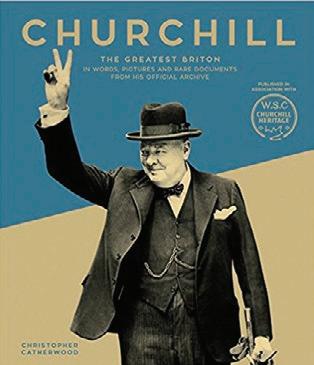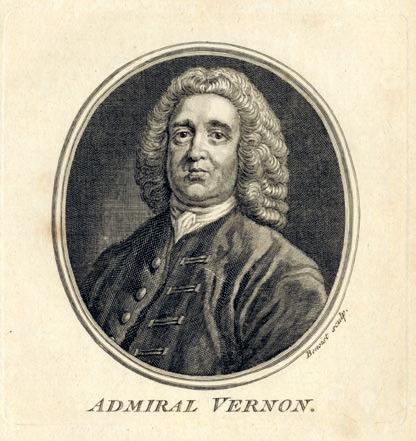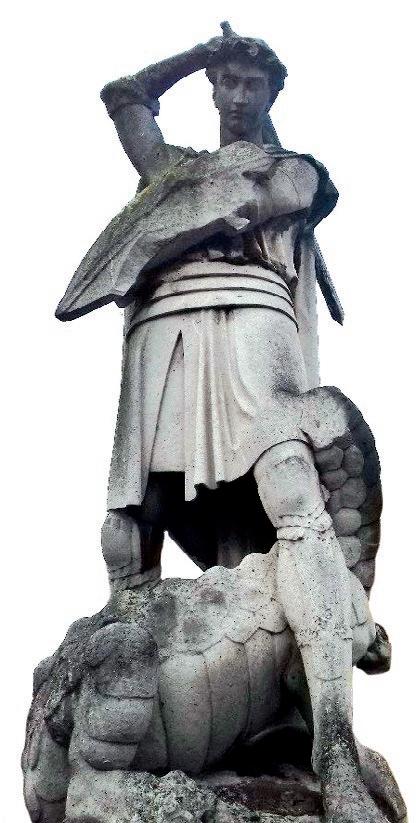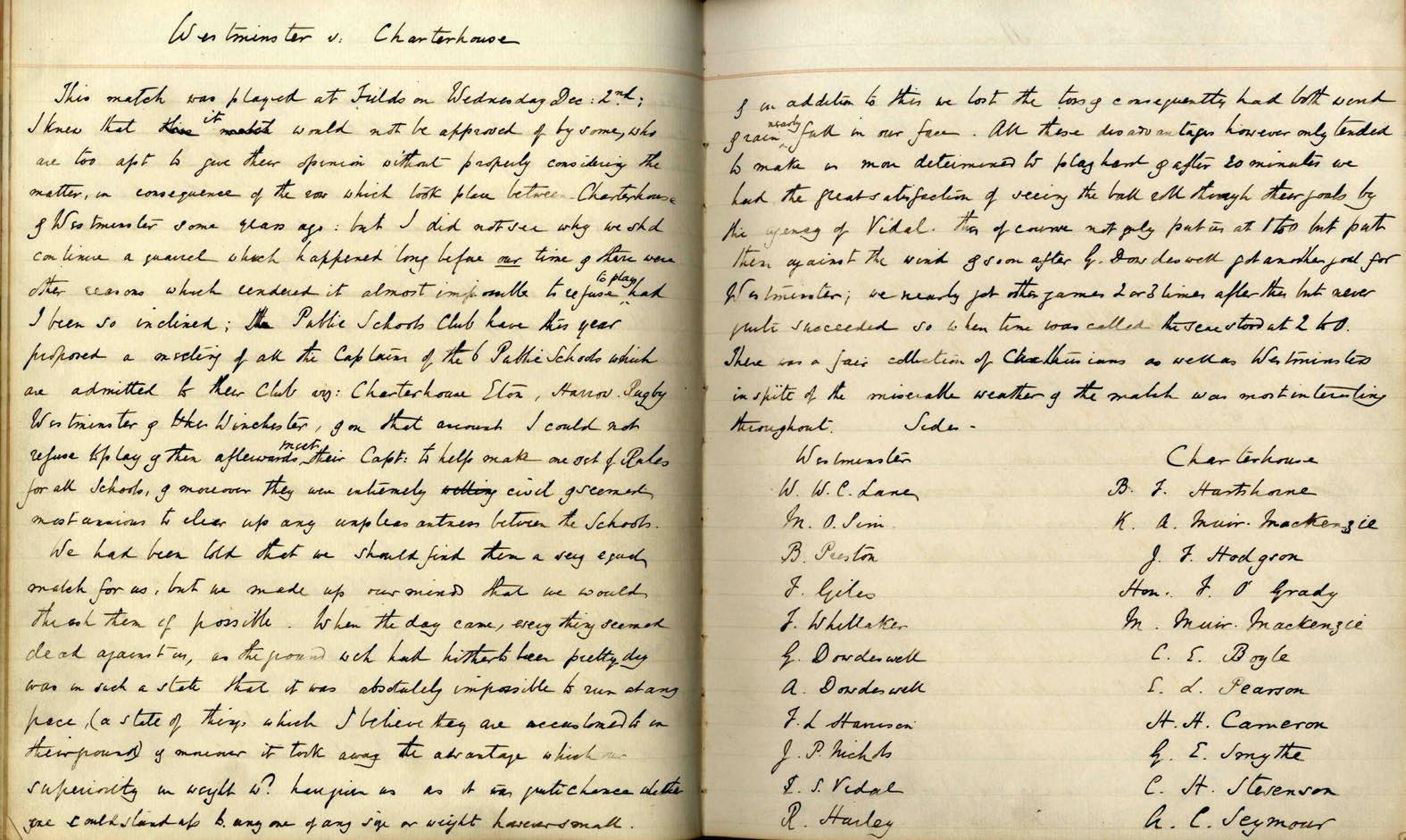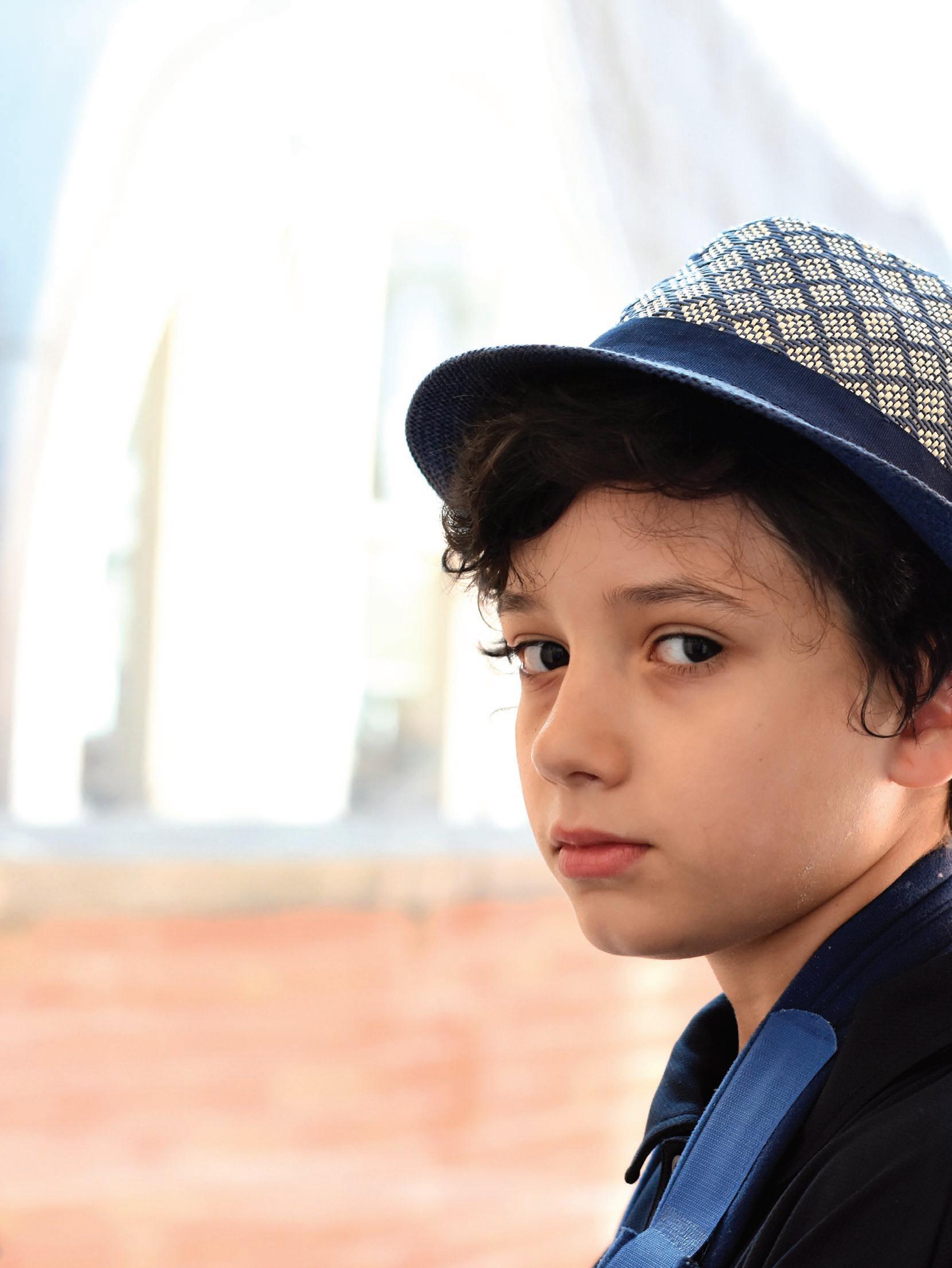
10 minute read
School News
TENDER SHOOTS IN THE WOOD OF OUR STATE Westminster School celebrated an historic moment when twelve new Scholars were elected to the College of St Peter, including, for the first time, four Sixth Form girls.
In a charter of 1560 Elizabeth I established the Collegiate Church of St Peter in Westminster, consolidating her father’s plans for two Masters and forty Scholars:
Advertisement
‘… the youth which is growing to manhood, as tender shoots in the wood of our state, shall be liberally instructed in good books to the greater honour of the state’.
On the historic election of the first female Queen’s Scholars, HRH Elizabeth II wrote to the Head Master, Patrick Derham, to send her good wishes.
Following election, the girls soon set to their duties, one of which is to guard the steps to School (the school hall) during Latin Prayers. This traditional role, that of the ‘Mon. Os.’ and now also that of the ‘Monitrix Ostii’, was to provide a security presence deterring passers-by who might be interested to explore what was happening up School. The pupil was also required to inform the Head Master of the time throughout the day.
As a source states: “[T]he day passed rather slowly with the Monos. He could, indeed, play rackets by himself, or with any boy who might come out of school for a few minutes – that was all. Still, in the eyes of most boys, the ‘studiorum remissio’ – ‘the forgiveness of lessons’ was a sufficient recompense for the monotony.” Gladly, there is no need to miss lessons today!
At the beginning of October we were delighted to welcome back Michael Jarvis, Captain of Queen’s Scholars 1968-9, who met with Hein Mante, Captain 2017-8 to discuss how the role has changed – and remained the same – over fifty years.
CHINA SCHOOLS Westminster School is thrilled to announce its involvement in founding six schools in China.
The income from this international partnership will help Westminster to fund bursaries for those pupils who need financial support. The schools are being created in collaboration with a Hong Kong education firm, with the first to open in Chengdu in 2020.
The new Chinese schools will teach China's national curriculum, “augmented by aspects of a Westminster curriculum.” The Head Master said the partnership with China would deepen a ‘cultural collaboration’ and that it would be a step towards being able to ‘provide a Westminster education for all who might benefit from it, irrespective of means.”
BRINGING COMPUTER CODING TO THE DEVELOPING WORLD Remove student Mahek Vara (PP) has set up an educational charity, Code Camp, to teach computer programming to children in developing countries. Already operational in 1,810 schools in Gujarat and benefiting over 78,400 children, Code Camp is now extending into the region of the Gulf.
It was her regular trips to India with her family that led Mahek to question why so many Indian children leave school without the computer skills necessary to express their creativity. “As I grew up, I realised that education for computing in state-funded Indian schools was in terrible shape, if it existed at all.”
Mahek decided to set up the Code Camp Education Foundation, a charity which, with the help of volunteers, imparts essential programming knowledge to children between the ages of 9 and 16. Mahek began by leading classes and teacher training days herself, coaching over 100 teachers. Teachers from remote places came and learnt how to implement the Code Camp programme in their own
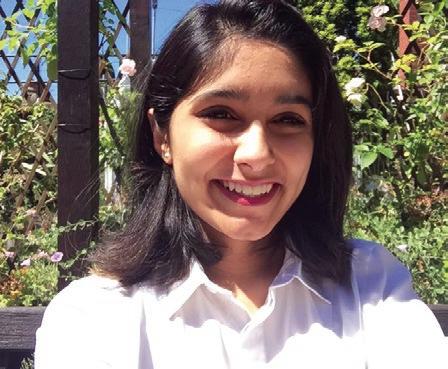
school. Code Camp can take place anywhere, so long as there are supervising staff, computers available and adequate space.
Now over 30 Code Camp volunteers not only teach classes of children in Indian schools but also train supervising staff so that they can teach computer programming themselves, through carefully designed specialist courses. Rapid expansion was made possible by the support of the Education Minister in Gujarat who helped Mahek to reach out to more schools, so that more children could benefit from Code Camp teaching and resources. Explaining the impact of her project to the School in Abbey, Mahek related a conversation she had with one of her twelve year-old students: “I asked him what he did during his free time after school and his response was that he had to work in a factory from 2 in the afternoon until 9 at night. He didn’t do it for his enjoyment or for work experience: he did it to sustain his livelihood. Many other children like him were spending their time after school working and were not able to use their remarkable talents. To think that I may have made an impact on his life is simply incredible.”
Over the Christmas holiday, Mahek has been in negotiations with Ms Hawa Al-Dawoud from the Arab Yoga Foundation, to discuss how Code Camp may be further expanded into the Gulf Region. Her ultimate aim, is that Code Camp should help and inspire children from low socioeconomic backgrounds to fulfil their potential worldwide.
IPSY, THE NEW APP FROM SIXTH FORMER ANDREW GLEN Congratulations to Andrew Glen (LL) who has just released his third App to the AppStore, a 2D physics-based game called ‘ipsy’. He explains it here.
“The goal for each level is to guide the ball to the finish point. The only way you can affect the ball’s direction is to draw the ground, which it will bounce off. Each level features objects to help players achieve their goal or to hinder their efforts: the test is to think both strategically, to find the optimal route for the ball, and geometrically, to make sure the ball bounces off the ground at the desired angle.
I enjoy writing software because it’s created in a very controlled environment. In Electronics, if you solder a chip in backwards, it could take you a fair amount of time to remove the solder and pry it back out. In cookery, once the cake is in the oven, you have to wash up all the utensils you used to make it. But in programming, there is none of this. Mistakes are rectified with ‘undo’, and there’s no physical downside to being creative!
When I started making ipsy properly, I knew I wanted to make a beautiful product. I wanted everything to be animated. I wanted colour gradients that matched the shadow on the ball, and a firework when you reached the end of the level. It took me a long time to complete because, having mastered the mechanics of the game, I tried to code it to look perfect from start to finish. Now, in my eyes, it’s the best app I’ve ever made.”
Andrew’s next project is with a start-up company building an app to help NHS physiotherapists track the quality of their patients’ exercises by using motion sensors in the phone. We are hugely impressed with his work and wish him all the best with his new project over the summer.
A WEEK OF SELF-DISCOVERY Westminster PHAB is a week-long summer camp for disabled guests, organised by the teachers but hosted completely by Sixth Form students. The 41st Westminster School PHAB took place in July this year and our ‘Phabracadabra’ week celebrated all things magical through our workshops and activities.
We welcomed 36 guests who have a range of disabilities, some of whom require assistance with almost all aspects of their everyday lives, to come and live with us. A team of 45 Sixth form pupils, supported by staff, trained to be carers for the week.
Guests and hosts alike took part in daily workshops run in School, with subjects including Art, Design, Photography, Film, Drama, Ceramics and Music. In the afternoon we took advantage of our location in central London with sightseeing and shopping trips; evening activities included a magic show, karaoke and a trip to the Curzon cinema.
The highlight of the week for many was undoubtedly the trip to the Warner Bros. Studios in Leavesden in order to enjoy ‘The Making of Harry Potter’ studio tour. Seeing the film sets, dressing up and getting the chance to try a butterbeer was a real treat for all involved! On Saturday we dressed up for our formal dinner and dance which was held to celebrate the week’s experience, and on Sunday we welcomed friends and family to a BBQ and show.
In Abbey, Davide Bertone (GG), Martha Cruz (RR) and Ed Easton (HH)
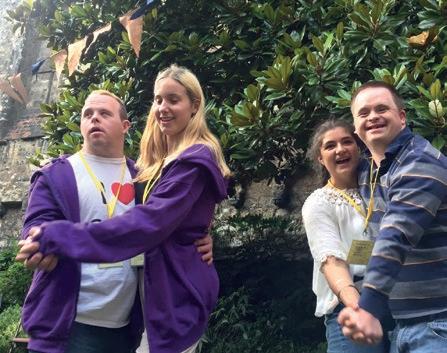
explained their experience to the School community:
“In the life of a young person, 90% of what you do is for yourself; during PHAB 90% of what you do is for others. That’s what makes it so unique. I first signed up because it seemed a great thing to be part of, but as the end of school year drew closer and closer, privately I started filling up with doubts. What if my guest didn’t like me? What if I ran out of things to talk about? And most of all, what if I didn’t know what to do? All the social anxieties of a teenager came to the surface.
However, from the moment we started setting up, there was an overwhelming atmosphere of affection and support between us hosts and the teachers. We were all a family with a common purpose from the start. And when the first few guests arrived, seeing their faces of pure happiness instantly woke me up to the reality that PHAB meant the world to every single guest. One guest had even started a 365-day countdown on his phone until the next PHAB.
It turned out to be the best week of my time at Westminster. Never have I felt as if my life had more of a purpose. My guest was the kindest and most friendly man that I have ever met. I will never forget him. He taught me just how fun living life in the moment can be.
PHAB was as much a week of giving as it was of self-discovery: learning to break through the limitations that a self-conscious teenager places on himself.”
Congratulations to all involved.

TECH SENSATIONS Lower Shell boys Bhuvan Belur (BB), Joe Bell (QS) and William Yu (GG) have won the second Raspberry Pi Pioneer Challenge in a brilliant demonstration of Westminster initiative.
The Raspberry Pi Foundation works to put the power of digital making into the hands of young people, so they can solve the problems that matter to them and are equipped for the jobs of the future. In this, their second competition for 11-16 year olds, entrants were asked to work together in groups to invent a new device to bring gaming into the ‘outdoors’. They then had to post a video on YouTube explaining what they had made, how they went about it and displaying how it worked.
Bhuvan explained, “Because the deadline was the beginning of July and we were busy with exams, we really only had three weeks to film and make it all. So we worked on it before school, during breaks and after school, as well as during Robotics Club, where we could call on Ms Bustamante and Mr Maynard.”
Their final submission was chosen as one of 5 winners from about 300 entries, receiving the ‘Technically Brilliant’ award.
As prize-winners, they were invited to the Pioneers summer camp at the Google HQ London where they spent the day making robots, and using the Google AIYY api to create their own Google homes. The day finished with talks by four Google employees in various fields, about the future of technology and what their jobs entailed, and a free tour of the YouTube space, to which access is only usually allowed for those with 10,000 subscribers or more.
But for the boys, the highlight of the experience was the actual making: “Staying up late, fixing bugs and figuring out new tech was incredibly fun. The most challenging thing was probably the time constraint, but it was definitely a valuable experience!”
We can’t wait to see what they make next.


